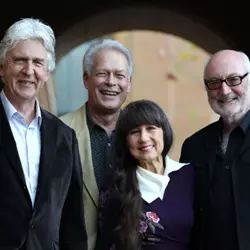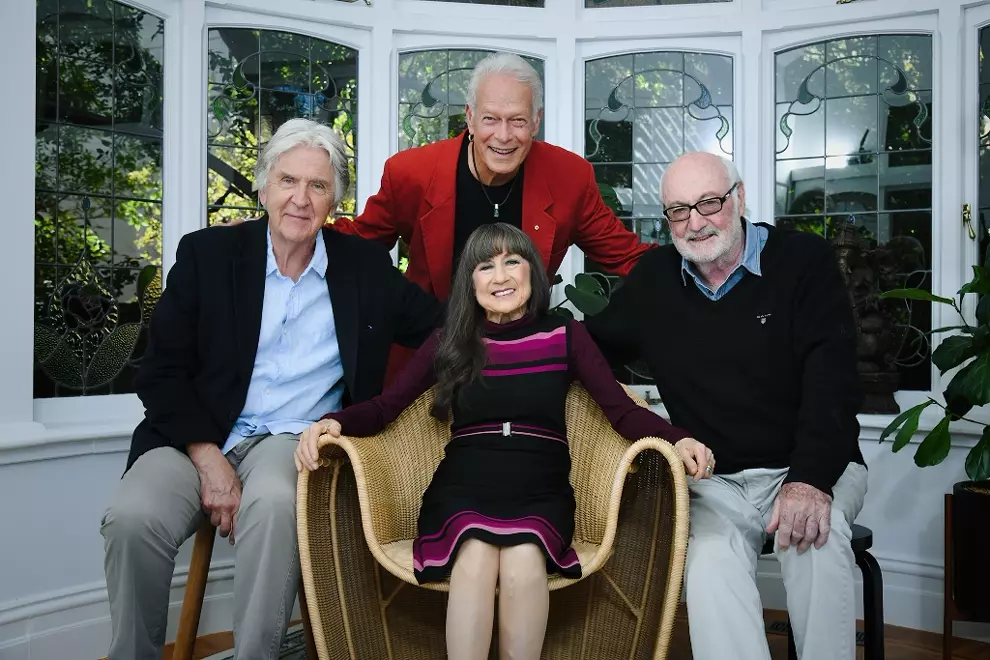 The Seekers
The SeekersOn March 28, 1964, The Seekers – Judith Durham, Athol Guy, Keith Potger, and Bruce Woodley – boarded the SS Fairsky, bound for England.
The singer packed only summer clothes, believing she’d be in the UK for just a few weeks.
When they arrived in London, Durham spotted a huge clock and asked her bandmates what it was. She had no idea it was Big Ben. That became a running joke in the group during their time in the UK: “What’s that big clock?”
The ‘60s were a time when Australian acts ventured to England with high hopes. Nearly all of them discovered it was a great place to starve and break up. But not The Seekers.
They became the first Australian band to top the UK charts when I’ll Never Find Another You hit number one on February 25, 1965.
And 60 years ago today, The Seekers returned to number one with the enduring classic The Carnival Is Over.
“I’m about to make a claim that might give some readers pause, but here goes,” music journalist and author Andrew P Street says.
“The Seekers were our Beatles.”
The band’s UK chart-toppers were both written and produced by Tom Springfield.
A simple twist of fate – and a bout of laryngitis – changed the course of Australian music history. Singer Susan Lane was booked to do a charity gig in Blackpool, but when she lost her voice, The Seekers were added to the bill. Their performance got a mention in Melody Maker and impressed another artist on the lineup – Dusty Springfield.
Dusty told her brother Tom that The Seekers were the type of act he could write for after their band, The Springfields, had broken up.
The first song he wrote for The Seekers was I’ll Never Find Another You.
Only problem was, Durham didn’t dig it. “My initial reaction was that the song sounded a bit square,” she told her biographer Graham Simpson.
Don't miss a beat with our FREE daily newsletter
“It had never occurred to me that The Seekers might become a pop group. It was very pleasant, but I didn’t necessarily think it was right for the group.”
With a number one smash, The Seekers and Springfield had a problem – they needed a follow-up.
The songwriter presented the band with a song called Downhearted Blues. Durham thought it was too downbeat. She suggested taking a line from the end of the first verse – “a world of our own” – and turning it into a “happy song”.
And then came The Carnival Is Over, a song that had a remarkable Russian backstory.
Mike Hurst of The Springfields explained: “Tom was immensely good at finding old folk tunes and doing something new with them. The Carnival Is Over is the cleverest of all as he revamped a Russian folk tune (Stenka Razin) and wrote an English lyric.”
The lyric was inspired by Springfield’s trips to Rio during carnival time.
Springfield actually gave The Seekers two songs – The Carnival Is Over and Hummingbird. Durham fell in love with The Carnival Is Over but says the rest of the band preferred Hummingbird.
“It was the first time I’d ever tried to really put pressure on the group, as far as material was concerned,” Durham recalled. “I felt in a way as though I was stepping out of line, but I was convinced in my own mind that The Carnival Is Over was the right song for us and I pushed and pushed for it.
“It would have broken my heart if I couldn’t have sung it.”
One line in the song has always intrigued listeners: “But the joys of love are fleeting for Pierrot and Columbine.”
Pierrot and Columbine were characters in Italian theatre. Pierrot, the sad clown, was in love with Columbine, who breaks his heart by leaving him for Harlequin.
Not long after the Seekers hit, David Bowie wrote a song called Columbine.
The Carnival Is Over knocked off The Rolling Stones’ Get Off Of My Cloud to take top spot on the UK charts.
At a time when the Stones were cultivating the original bad-boy rock star image, The Seekers were the polar opposite.
In the world’s first rock encyclopedia, Lillian Roxon described The Seekers as “one cuddly girl-next-door type and three sober cats who look like bank tellers”.
While other rock stars were throwing TV sets out the window, Bruce Woodley joked that The Seekers’ headlines would read: Seekers Clean Up Hotel Room.
The chart-topping success of The Carnival Is Over prevented The Beatles’ double A-sided release, We Can Work It Out/Day Tripper, from entering the charts at number one. It was the first time a new Beatles single had not debuted on top in two years.
The Fab Four’s manager, Brian Epstein, was furious.
“The chart must be made up of figures from fish shops,” he huffed to Melody Maker.
As well as knocking off the Stones and stopping The Beatles from debuting on top, The Carnival Is Over prevented The Who’s My Generation from hitting number one.
The Carnival Is Over spent three weeks on top and sold nearly 1.5 million copies in the UK.
Judith Durham’s most vivid memory? “At that time, on the cover of Vogue there was a pair of white leather boots, and I said to myself, ‘I’m going to buy those boots if we get to number one.’
“And, of course, it went to number one, and I bought my boots!”
It was a remarkable year for The Seekers. As well as two UK chart-toppers, they were also voted Best New Group at the NME Awards, performing at the winners’ concert alongside The Beatles, The Rolling Stones, Donovan and The Kinks.
“And there we were, little Seekers,” Durham remembered. “I mean, blimey. There I am in my homemade dress.”
UK music journalist Everett True was a key player in the grunge movement – famously introducing Kurt Cobain to Courtney Love – but even he was moved by The Carnival Is Over’s beauty.
“I think it speaks volumes for Australia that The Carnival Is Over is such a loved, shared touchpoint,” he wrote in 2014.
“I will never tire of it.”
The Carnival Is Over found a new audience when it was covered by Nick Cave And The Bad Seeds on their 1986 album, Kicking Against The Pricks.
“Some songs had just kind of haunted my childhood,” Cave explained, “like The Carnival Is Over, which I always loved.”
In an interview with the UK’s Record Mirror in September 1986, Cave reminisced about The Seekers:
“They were Australia’s big white hope, and I despised them, naturally!” But the Prince of Darkness admitted that “there were a couple of songs I secretly liked. And now that I've matured a little bit, I don’t feel so hesitant about discussing those likes.”
Cave said he thought “we could do a poignant rendition of the song”.
Durham called Cave’s cover “a lovely compliment”, though she described his version as “doomy”.
Four years before Cave’s cover, German disco stars Boney M also recorded The Carnival Is Over. Their cover hit number 11 in Switzerland.
And American duo Dean & Britta – Dean Wareham and Britta Phillips from Luna – recorded The Carnival Is Over during the Covid pandemic in 2020.
Wareham, who was born in New Zealand and then lived in Sydney, recalled hearing the song during his childhood.
“I spent my earliest years in Wellington, New Zealand, where the Seekers were as big as the Beatles,” he says. “They (and the Beatles) are the first things I remember hearing on the radio.”
Years later, the Wareham family moved to America, where Dean discovered “this Australian folk-pop quartet was not a big deal at all”.
“To this day, it’s hard to explain the Seekers to Americans. They did chart in the US with Georgy Girl and I’ll Never Find Another You, but I have never heard them played on American oldies stations.
“They pre-date full-blown folk rock by a couple of years and are sometimes compared to Chad & Jeremy or Peter, Paul & Mary, and recorded a number of the same songs – as was the habit for folk groups – but I would argue that the Seekers reach a level of ecstasy that Peter, Paul & Mary do not.”
Andrew P Street included The Carnival Is Over in The Long And Winding Way To The Top, his book on the songs “that made Australia”.
Explaining his belief that the band was “our Beatles”, Street said: “Yes, The Easybeats were cooler, had the closest thing we ever got to a Lennon/McCartney partnership in Vanda and Young, and made records that didn’t sound like soundtracks for a wholesome church group frolic, but the facts speak for themselves: The Seekers were higher selling, more popular internationally, and even got in early with the whole unexpected break-up thing.”
Judith Durham shocked the music world – and her bandmates – when she quit The Seekers in 1968. Athol Guy introduced The Carnival Is Over at their farewell concert, “Tonight, the carnival really is over.”
Durham noted the crowd was “literally grief-stricken. Fans sat there with tears rolling down their faces.”
After The Seekers broke up, Athol Guy entered politics, becoming a Liberal member of the Victorian state parliament from 1971 to 1979.
During one federal election, he bumped into Gough Whitlam at a campaign event. “Come over here, Guy,” the Labor leader said. “Let’s get photographed together and make each other famous.”
Keith Potger put together The New Seekers, who, like The Seekers, had two chart-topping singles in the UK: I’d Like To Teach The World To Sing and You Won’t Find Another Fool Like Me.
Bruce Woodley had a successful songwriting career, co-writing I Am Australian, which Judith Durham recorded with Air Supply’s Russell Hitchcock and Yothu Yindi’s Dr Yunupingu in 1997.
25 years after exiting the group, Judith Durham reunited with the band for a successful second Seekers act.
The Carnival Is Over remained their climactic closing song.
“You just simply couldn’t have a better finishing song in your repertoire,” Athol Guy believes.
“It is very poignant. It’s a summary song emotionally, it collects everything. No matter what you’ve done right through the whole show, it gathers everybody up.”
“The Carnival Is Over was a great song and still lives on today,” Durham said. “It is a perennial favourite, and it’s sung at weddings.”
The Seekers were scheduled to perform The Carnival Is Over at the closing ceremony of the Sydney Olympics, but their appearance was cancelled when Durham broke her hip.
Ironically, John Clarke and Ross Stevenson’s satirical mockumentary series about the Sydney Olympics, The Games, had predicted the band’s no-show in their final episode, with the stars of the show – Clarke, Bryan Dawe, Gina Riley, and Nicholas Bell – standing in for the band.
The Seekers did get to do the song at the subsequent Paralympics, with Durham performing in a wheelchair.
“We were very, very blessed to have met Tom Springfield, as he never compromised the integrity of the group,” Durham reflected. “We were, after all, completely different from everything else that was happening at the time.”
Judith Durham died in 2022, a week after Tom Springfield’s passing. He was 88, she was 79.
Paul Kelly and Jess Hitchcock paid tribute to Durham by performing The Carnival Is Over at the Myer Music Bowl.
The rendition showed that for The Seekers – and their legion of fans around the world – the carnival would never be over.
Now the harbour light is calling
This will be our last goodbye
Though the carnival is over
I will love you till I die
This piece of content has been assisted by the Australian Government through Music Australia and Creative Australia, its arts funding and advisory body



















